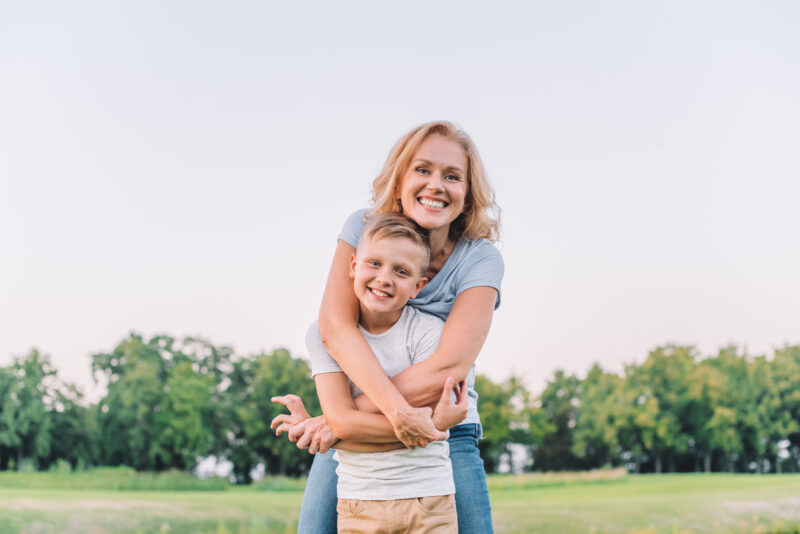
How Can You Help Kids Manage Anxiety?
4 min.
Learn how to recognize your child's anxiety and support them with expert-backed strategies, coping skills, and professional care.
Childhood anxiety is a mental health condition that causes persistent fear, worry, or nervousness in children. It often goes beyond typical childhood concerns, such as being afraid of the dark or nervous about starting school. When a child’s anxiety becomes intense, frequent, and disrupts daily life, it may signal an anxiety disorder. For example, a child with panic disorder may experience panic attacks, while one with separation anxiety disorder might have a fear of being apart from caregivers.
If you notice your child struggling with unusually high stress or symptoms that seem like an anxiety disorder, there are approaches you can take to help. Read on to learn more strategies for helping kids manage anxiety.

Support your child’s emotional well-being today
Connect with a licensed therapist trained in treating anxiety disorders in children.
Signs of anxiety in children to look out for
Recognizing anxiety in a child—especially a younger child—can be difficult, as they may struggle to express their feelings. Instead, anxiety often shows up in physical symptoms, behavioral changes, or emotional outbursts. Common signs include:
- Physical symptoms like stomachaches, headaches, or fatigue,
- Signs of a panic attack (rapid heartbeat, dizziness, or shortness of breath).
- Intense or irrational fears
- Anxious feelings that are easily triggered
- Avoiding school or social situations (often called school anxiety)
Why is my child so anxious?
Many factors contribute to a child’s anxiety, and understanding the cause can help in managing it more effectively. Genetics play a role—kids with a family history of anxiety, depression, or other mental health conditions are more at risk. Stressful life events, like trauma, major changes, or conflict at home or school, can also trigger or worsen anxiety. Some children are simply more sensitive or cautious by nature, and biological factors like brain chemistry and heightened stress responses contribute as well.
How to support an anxious child
Whether you’re parenting a young child or navigating the emotional world of older children, there are practical steps you can take to help. Here are some strategies that work:
1. Validate their feelings
Let them know it’s okay to feel scared or overwhelmed. Say things like, “I see this is hard for you,” rather than brushing it off. Use simple, concrete language: Especially with a younger child, avoid abstract explanations and focus on real-life examples and experiences.
2. Model healthy coping skills
Deep breathing, grounding techniques, or a calming routine can help anxious children manage symptoms. Also, though it might be tempting, avoid avoidance. While it’s natural to shield your child from distress, avoiding all challenges can reinforce fear. Gradual exposure builds resilience.
3. Create a safe space for processing feelings at home
Teaching kids how to manage anxiety equips them for lifelong emotional wellness. Encourage them to:
- Name their feelings: This helps bring awareness and reduces overwhelm.
- Create a calm-down space: A sensory-friendly environment where they feel safe.
- Develop rituals: A bedtime routine or morning checklist can ease transitions.
- Practice bravery: Celebrate small wins when they face a fear or challenge.
Let your child lead their own pace of healing. Empowering them with choice in how they handle their anxiety strengthens trust and independence.
When should you seek professional help?
Some anxiety is a normal part of childhood—but when it begins to interfere with a child’s functioning, it may be time to consult a professional. For instance, if your child struggles with panic disorder, school anxiety, or persistent worry, don’t wait to seek support. A structured treatment plan can make a world of difference. Seek help if your child:
- Experiences anxiety most days or in multiple areas of life.
- Shows signs of panic attacks or frequent meltdowns.
- Avoids activities, school, or social events out of fear.
- Cannot be calmed or comforted, even by familiar adults.
Professionals in adolescent psychiatry and child psychology can help identify the root cause and recommend treatment options.
Treatment options for child anxiety
Effective treatment helps your child develop the skills to manage their anxiety over time. Evidence-based treatment approaches include:
- Cognitive behavioral therapy (CBT): A therapy style that teaches children how to reframe anxious thoughts and develop problem-solving skills.
- Play therapy: Especially helpful for a young child, this allows them to express feelings in a non-verbal way.
- Family therapy: Offers strategies for parents to reinforce healthy emotional habits at home.
- Medication: Sometimes prescribed in severe cases, usually alongside therapy.
Whether your child is dealing with separation anxiety disorder, panic disorder, or generalized anxiety, consistent support is key to progress.
How Charlie Health can help
If you or a loved one is struggling with your mental health and could use more than once-weekly support, Charlie Health is here to help. Charlie Health’s virtual Intensive Outpatient Program (IOP) provides behavioral health treatment for people dealing with serious mental health conditions. Our expert clinicians incorporate evidence-based therapies into individual counseling, family therapy, and group sessions. With this kind of holistic online treatment, managing your mental health is possible. Fill out the form below or give us a call to start healing today.

